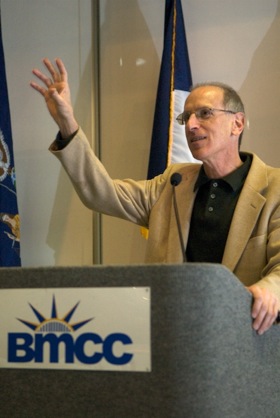
Randy Cohen, author of the syndicated column “The Ethicist” featured in The New York Times Magazine every Sunday, discussed politics and praised BMCC as the guest speaker this fall at The BMCC Foundation’s fourth annual Donors & Friends Reception.
The event, held in Richard Harris Terrace, marked the start of the November-long CUNY Month, putting the celebratory spotlight on the donors whose generous funding has provided scholarships and enriched programs for BMCC students.
“Your big hearts allow us to provide students scholarships and other opportunities we would not have with just public funding,” BMCC President Antonio Pérez told the crowd at the start of the event.
A Pat on the Back for BMCC
Cohen followed Pérez with more compliments for The Foundation, a not-for-profit organization that helps the college acquire financial resources needed to support student scholarships and other initiatives.
“It’s one thing to have the desire and be willing to contribute money and effort, but it’s quite another to do it effectively,” he said, then moving to compliment the teachers in the room.
“It’s also incredibly hard to make a difference in the lives of others,” he said, “but at BMCC, you routinely make profound differences in the lives of your students, many of whom are the first in their family to attend college. Going to college … is absolutely proven to be a cycle-of-poverty breaker. If you go to college, you’re going to make more in a lifetime than if you do not. If you go to college your children tend to go to college. You automatically change the lives not just of your students, but of generations.”
“I’m particularly impressed with the work you do here, because, unlike you, I’ve been utterly ineffective in making social change of any kind. My puny efforts at social change mostly have consisted for decades of donating money to losing political candidates,” he said, alluding to a topic he would later discuss.
First, he made time to give credit to the students of BMCC, “Many of whom are attending school while holding down full-time jobs. It’s so much harder, and so much more impressive .. than the way I went through school.”
“And you’ve attracted crowds of them!” he said, referring to the students. “It’s impressively uncomfortably crowded here, a testament to your success. Keep being successful and it’s just going to be awful!”
Cohen’s Career
Ethics is a branch of philosophy that focuses on how humans ought to live. Cohen has no philosophy background, so the task of being “The Ethicist” is truly a dream come true. But his lack of a philosophy background may have actually helped him get the job: instead of speaking in hypothetical situations, or using deep theoretical jargon, he applies easy, yet substantive logic to real-life quandaries, something the Times liked when he interviewed. But, for Cohen, there has been one minor “ethical” controversy.
Back in 2006, MSNBC.com ran an investigative piece listing what journalists had donated to political candidates. In 2004, Cohen donated $585 to MoveOn.org, an organization that works to elect progressive candidates. But, Times’ code of ethics forbids its workers — full-time, freelance or otherwise — from engaging in political activity of any kind.
“‘Ethicist’ unethical, it’s just so darn ironic,” he joked.
While some of the more than 140 journalists on MSNBC’s list got fired, the only repercussions Cohen saw was a “firm, but courteous e-mail” from his boss, and one paper — the Spokesman-Review in Spokane, Wash. — dropping his column (though it hadn’t started appearing in the paper yet, and had been scheduled to begin running on the following weekend). However, Cohen doesn’t consider his donation unethical.
“Clearly a journalist can’t participate in events that he or she is covering,” he said. “It would undermine your ability to be objective. But I don’t cover politics — indeed, I don’t cover anything. So I don’t see how donating $585 would undermine my ability to do my job.”
“In fact, I write a column of opinion,” said Cohen. “It’s my task to make my opinions explicit, not to cover them up. Donating this money is just an expression of my ideological beliefs. That’s what I’m hired to convey to the readers.”
Moreover, Cohen remarked that “to have an opinion is not to have a bias. I have opinions about lots of things but they don’t undermine my ability to do my job.”
Cohen called for journalistic ethics to be a practice in transparency.
“Disclose everything,” he said. “This is who I’m voting for, this is who I gave money to, and let the readers make whatever judgments they want.”
But this election year, Cohen didn’t give a dime. Why?
“I really like my job, just as I know you folks like working here,” he said.
Like a Teacher
Cohen remarked that the Times’ position on political activity is much like how New York City teachers are not allowed to wear campaign garb in class (Story). As usual, Cohen had an ethical opinion to register.
“This is a terrible rule. It stifles free expression. When you enter a classroom it doesn’t mean you give up your civic rights — or, in my view, your civic duties,” he said.
Instead, Cohen said teachers should toe a fine line and involve students in the political discussion of the day.
“There’s a power balance between teachers and students, and you have to be mindful not to bully your students with your politics,” he said. “But a conversation doesn’t have to be a confrontation. You can handle this tactfully.”

